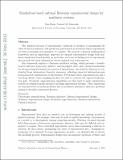Simulation-based optimal Bayesian experimental design for nonlinear systems
Author(s)
Huan, Xun; Marzouk, Youssef M.
DownloadMarzouk_Simulation-based optimal.pdf (6.943Mb)
PUBLISHER_CC
Publisher with Creative Commons License
Creative Commons Attribution
Terms of use
Metadata
Show full item recordAbstract
The optimal selection of experimental conditions is essential to maximizing the value of data for inference and prediction, particularly in situations where experiments are time-consuming and expensive to conduct. We propose a general mathematical framework and an algorithmic approach for optimal experimental design with nonlinear simulation-based models; in particular, we focus on finding sets of experiments that provide the most information about targeted sets of parameters.
Our framework employs a Bayesian statistical setting, which provides a foundation for inference from noisy, indirect, and incomplete data, and a natural mechanism for incorporating heterogeneous sources of information. An objective function is constructed from information theoretic measures, reflecting expected information gain from proposed combinations of experiments. Polynomial chaos approximations and a two-stage Monte Carlo sampling method are used to evaluate the expected information gain. Stochastic approximation algorithms are then used to make optimization feasible in computationally intensive and high-dimensional settings. These algorithms are demonstrated on model problems and on nonlinear parameter inference problems arising in detailed combustion kinetics.
Date issued
2012-09Department
Massachusetts Institute of Technology. Department of Aeronautics and AstronauticsJournal
Journal of Computational Physics
Publisher
Elsevier
Citation
Huan, Xun, and Youssef M. Marzouk. “Simulation-Based Optimal Bayesian Experimental Design for Nonlinear Systems.” Journal of Computational Physics 232, no. 1 (January 2013): 288–317.
Version: Author's final manuscript
ISSN
00219991
1090-2716